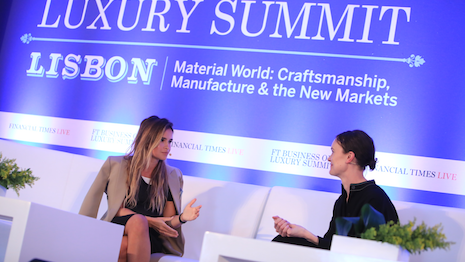Bringing together the great and good, the Financial Times’ will focus on luxury disruption and the innovators who are changing the narrative at its FT Business of Luxury Summit May 20-22 in Venice, Italy.
Using the backdrop of Venice – a city that has reinvented itself repeatedly over the centuries – the fashion-focused conference will discuss how traditional luxury houses can innovate to stay ahead of industry disruptors. Other issues under deliberation include the millennials and Gen Z and how they are changing the retail and media landscape.
“We want to explore how young and established brands are innovating to stay ahead in this changing consumer landscape,” said Jo Ellison, fashion editor of the FT, London.
Here is the dialogue with Ms. Ellison in its entirety:
Disruption seems to be the “in” word across every business sector. What does it mean in luxury and fashion?
In the luxury market disruptors come in many forms, but we’ll be looking specifically at how digital has changed the way brands market their products and services and how consumer spending is paving the way for new industry innovators.
The FT has the pick of themes to choose from each year. This year’s choice – which other themes were in consideration or could have been?
Millennials have been driving spending in the luxury market for the past few years and are expected to account for over 50 percent of sales in the next five years.
We wanted to focus on brands that have achieved incredible growth by harnessing millennial and Gen Z clients.
What can attendees expect this year at the Venice summit in terms of content and presentation? How many folks do you expect will attend versus last year?
The two-day flagship event features interviews with some of the biggest names in fashion, including Diego Della Valle, Cédric Charbit, Stefano Gabbana and Domenico Dolce, Katharine Hamnett, Luca di Montezemolo and Erdem Moralioglu.
Marie-Claire Daveu, chief sustainability officer at Kering will be addressing key industry issues such as sustainable fashion and green manufacturing.
Italy’s former prime minister and president of Bocconi University, Mario Monti, will discuss the industry’s economic outlook with the FT’s chief economic commentator, Martin Wolf.
More than 400 people registered last year and we’re expecting a similar number to attend this year.
Why the choice of Venice? How far out do you decide the venue for the conference?
We decided to host the summit in Venice as its historical role as a luxury trading center made it an interesting place from which to examine disruption.
Venice has had to adapt and change over the centuries to meet the changing market. And is still thriving.
The lineup this year has a mix of young and experienced executives from new and established brands. What was the thinking behind your choice of speakers?
We want to explore how young and established brands are innovating to stay ahead in this changing consumer landscape.
We’re excited to welcome the 25-year-old CEO of Rimowa suitcases, Alexandre Arnault, to the stage and, of course, the classic Italian duo, Dolce and Gabbana, whose 37-year-old company has gone through enormous change over the years.
You’ve covered the business for a while now and have the benefit of a big-picture view. What is likely to change in the next couple of years that marketers need to start working on now?
Experiential luxury, travel, food, wellness and health have become huge signifiers of growth in recent years.
It might be hard to name names, but are there any brands that you cover that are handling change and evolving consumer tastes and consumption behavior the right way? Even sectors – which ones seem to be ahead of disruption or, at least, grappling with challenges in the appropriate manner?
Balenciaga has seen phenomenal growth in the last couple of years – 76 percent of its business is now driven by millennials.
Rimowa has charged ahead with a number of collaborations that have engaged with an entirely new customer base.
Dolce&Gabbana have been incredibly agile.
But it’s interesting also to look at newer brands like Gabriela Hearst – a luxury brand that has introduced lots of different strategies including sustainability and vertical production – and is still producing an extraordinarily high-end product.
Back at the conference, what should delegates who attend the luxury-summit circuit worldwide expect of the FT and its moderators this time?
Delegates can expect agenda-setting, informative sessions from a stellar line-up of speakers across the fashion industry.
What’s your favorite memory of last year’s FT Business of Luxury?
Talking to such a range of different experts.
I always find the conference gives me loads to think about and sets thoughts in motion that inspire me for months after.
Please click here to register for the FT Business of Luxury Summit in Venice, Italy on May 20-22, 2018
{"ct":"WCYGD0SIrfVI1lOWjkIUGmDmQL2e\/hHrAGW5rvdIf\/UKPV8WDV9Uoma8oR59cV3vKycqlg+dZzKi\/78A9lTHGjEMVk1LnzRyoqvR7NEr22NtjVYYqrvi3TEnem3VE8zMQm4mh9dZfLP93vpO7j7s\/jaIbHGMFyjTt6CXXwg6t3anWtN2Blrp6yXw2s6ItZ1UIi1rrQnoZcmb9JKjCTkXw0UHDFvcceC5ifZBuFjGvNTEAiaJ\/fP9RRzrcXQQ49yOWhCd8fEeuQPr221\/rQucJcbUSr50Q+2pu5M3Th6Xts4BEYrO3J\/w4I\/+ec3CE7IPLne6naAfW9o2mOeXwxUiBdzF7crLEx9Xho302U3j8qnFr+s\/bSGg5vJnZHeHOwkv+FSLbvih3SmMrd4DsyRUxm1HP01nl9buG47SJBfzq\/Uga9tbsIL248jaPJDu4y3p\/+7fuvdyfAYN7PcFUkNY06qwr1qouBTajgSv472+hz2aAxbO4lEFpZl5qXPsem6EujKDLXPGYAf5Ta2bE5Da6XodtN9LHBvnD8d\/LSiRkENy2h+tIF0cVqpZCDKqAwotQNmJpmZ95VUXevcfQF0n+tPuWZ+P8l6D04EtHfk2JtfdcJtjcvGlGw3b30qxz\/lZFo1wBWRlP4uVPsSutPxgB0ox3IvyQeeC+jjhTFwVx6\/BRtaGX8eaI1miq0re0X9P0LS33vfHFME5aOr0TTx08a9E3RMLCT7Ul6Ul6OVlhXUpVV4SLdQcPw\/p7KeDRJRKjpx3RjojvOpCaykglKxG87xZg+h3TWH91vZlgLUkxt88qaFK4DvqON8fBxqM6ovyblC8SjWkvNyzrOFfoWRnMtlT7y+OQdLBAnbF1BC7iuG9GU0S7Xy8I0c3Nbe6H75Y9jVh8YjpeBV8R0lX8Fwir\/qjLpq0bvc8dLNbqF11IzVnV\/LOH1Yq5jacqv7fKLX3ZnDT8xEIWh16cpSX62\/b7wKhrHoaM\/DOCxnx\/a5PFiUtKkRIpO2961mvMAlJSvDQAnIdSPwmJliNpvh6EygmXmflo0LPquOewpY7VNWd7KSjqyyvK\/2Uhn\/3P\/MPKVCKEw4Dx+DrpGTGvQWvEdPmjrA9C5Ja0yD5AfJdo4tp4Wgs5JDtxdLL10dZMgenjC2LwiFUtxyDFrDu0kxZw7p9iYlW\/k1QjAAGG7lO\/k8u3FhI3UjDf6kRMC\/jz5yZ4a57iyyJbhCiazNOO776RHTS1q8OLPqQ2fT44M9tHV56r88Lq3VW+uPT+wWBEXmb1dWBvEGdDxekDuQ6lOsn6cPxRh9t3JqlO1k90O\/IB8r3\/LdglSIkUvdcBzOeS3I9kLtxwVqhmdoHfx0ptrubmHhXuVfDfHHK8Uau+nevYyI3SkaoBnEACeA5+4bUIomt5hinnbXUkJttkrHrDvMt+fBC1hE1Bm1FbyPW16vuIp7rGEx+abtSBLD3dxLODkTkix2Hsxi9yEDquGdomXDr92ai4RQKh5bxL5NZ2wCGCIKkzztyqvFsHTAJa1zY11jpqtiGcteJscRQhgxwcd1BOBQkePhGO03VXZKh5jGkivO3VoD7urzGYAkGl0avt0Cgx4yA0JkSSEYwSGffD6BUuWS8dTl2criuiBCugMRDF\/qfOEaQh724tgUyjLkcX5An1JzBra+X7ZxVxSmdQYEKJ48mFc1wdlt4ZDPamSAjlIE45P2GkfH5iDpiO+z8jc1BSnFtjsLtxgUUt3gFLTL0kvbegavasO6z1iL2Dcj5\/A4uSJuplmBOOfxMokGv13R1kHRgKfO4TLwDgEQfsAXkd3WfjZt9WQoigVO7v\/436RMifIaU3jpg6\/oBWBSfNaobBschexzPSTGvNdI8lvnniZ8pAMAUr0v2RucvZy66yNsfBYrQRsjw\/u0TgxPDtqQEvXvDAibzi\/C3hyhIKHoZ5tgKg0x8G5Q05AVBYJXc5QmacdDWzijbrw2cJd\/8iLVgSrzu319pA\/VOpkKwFknUZceqkxZQzSvCx49fKe0bthYXtfSkydez8wjYwcozw7RYCZfcO1d6XOI1qrZqSxBD1i7EoCHLcm0GCLZ8\/OQiB2ofchI+\/3eAENW3zdvfLEyFngn4LwgOIgpGg12QAoeE\/wx+Kdd9NfOJoBMOL2s\/wkX0vlsMMGesIVk+CQPfLO2nov\/+NYcC7P8HWMBiY56hAzdT4piSKspn9lclzZ6fUfxf1evwWnyn3TfEq2+dbuD\/mBGcpDiEMjY0xzXPlla\/9byqVuIL8Pw6qNtAzNVvzbxWNlndkpxol5x0aaiW4bpivDNHHmn\/AkwS2otyOlob9rdy63oqqKNoK5DqMx1ExgsqpEB6V0taZLtdGyInx4OPiLvDei1TgGVkKt\/jIkG3Qopk0olXNO+14w166K3ivATd4F1RRKWRSzvskBoXKxi7gPAamKr\/jjOCTJ849aQ\/1v2yqH8YKMmpVUv\/BQhfHp10GTAU8eJgk6Kf2k7IXR9zOyiwxiIKKpIKjYfc5N\/9AjfIoEl28p2\/LGbqD2+aOxPRbLbq08fN3un++PWRD07fFFLz33julffXJta9PSlf6mXLcWEUubbISWtbnf7J\/HxcU\/NQU7e4jGiNQ\/WIrUaIM5LfqNM13aUVjhuYmJkO26e\/wtv0ma3mqXn2xGRkCVo2PvcouuKa+8jwXGoDFpasXMCQWsc7Wvd3ol3LeczPihFZj8Jq7RqovWpU7vMLtUanmCkL6S1TfMlX5TD0h2GV2ofsoOOwamhUuyXXPIEoo4bvALhW4fdy5eFY3stBZaREhxhjMreLreUokFOKZXhMpdQznDZoSAI31guReVt\/DikQm9nMbD8xxLrfE3zozCbRRjiyanW8UsXRr7Ve44gf+k\/g9De9i5LzRnHQSPY8WszO6mzv\/gqIIVB47l6ffq5SEAKnIAm6PBowfhg0gS+oTR7k9mPd9VbtUj1F2fmC45xz6\/YPogaNsMw88XhcL9iBeuKXcmgcwQnpxH5e7Wk2tARTqqAy51WugxzbfE5kqzJiBBty\/npqxJk8adAROlP11DDlsRwo8T3xdJV2APbP1HKE5\/wgCB6YrLDRqHVIata4a\/i3p\/X\/Xx\/EwAbtraLTce4mtJyJeZ0NOvxGD6u9j006HVpwZ227\/eyZxImXBzHpELcD6t3gT+++L\/CgzuAV7IpC\/MIYefIQEZ4BZVqP3c8P6xMg+ED8sk2Eyles5WuD\/317SvpMvxQnKugjNwm\/bdJPOOshfpGRSZ6NoWqvsYfj\/umvOPIFvalmUGsD88vYVrBOC62bP1hvexY9\/Tdy32ZGrfKk6CWhuZ6YYF8Z67V0Yk\/VQH+l40+vJKWv3bTJSRWRb4LkS9oOstWtu0BjG5Td+cG0rb36u1ljahOi4i+b5yswggWBiZHE1daYnNg5qCmmcolZ3Ive1042LJEJi3ffTT\/L1NyUBiqZHO0uuGpylKzuQB3YjvDDeG03C2xkkYRhFqxixeDAplRt9xJyH+9dd4zQTFlMizNgEPdQ8dgefleEMs7hsRDKDRj0XvLQFx5QZsrq0QSNp70U3wvX\/nZ2b0C6RCgX7OHj0R17DfMUOtNK+wYLMtKCRPmEjDkqd4+EJpUVxUrNy2RZT60Q9vSxheExinkFS+4A2fJD+Tth4oL7OvDNR+zU0F1GAthg4Eu+8lJ4lCtratIQkHtDu0ONHbGLln2HlW5BxIrvtpJTjaqEUlrwTGWBXx900tPhDLPsvW55oOR6AfMTvmlE4Us1B1Ur8lY\/VYSn7URa4Io6P6Pi8L5jGwQazBDfsRlTKZ8qcSaCrmVeA1CK3qlPKirDTC+39jYQFNYLNZ2YIm9NO3lInLuELRanUzKXdv\/mMFcWpAwKbjJ81UzsqerWATPQIqhpQdikWlm4ZgUIqfdLeH2cZmizOPN4MHgb0l6i7myGiPQNltMu3y1plqvh4Ajmecfy3RwY+fhs5SAs3N8vKx3jFXSlqV6jcsl3LE1d5D8Or33Lc4KHTUhXRq0qWuf\/+LNUgVqP5ezGCbqB6YcV1DApVDCpgUVj8hroktI4WkS4uNXQZ0GAVJgBsQCkw9Z+Pko3qd6eHOGzr5\/VapJPq+4+iEh0R+Ya7MUITQGesMjnPYHz\/7OOxJf74umBasONOOx35giGAvurWPc4ZJqc+lyL3G9tmS6l\/sSLkYiZ\/rBLduvtau13xfQovnKUppgEOKvpZyWO3z+bOAUoAAkdC\/AKJ80chkOwbynJm5W+MUg3JtITaDMG5PozXrYEGMm5dkuXNpAnSwfgVyoIu3fCozI9qGBrMydJS7JnfrwkcJbZKo3\/XKGHpW24bOyX4yvhqwTBWpRnLJQnK60vczkEz67vs9NjcNY7I+3se96hIC+adyoUgOSfzNhfVW3wDVJtiA2\/SGaBJV9nQckfib+6dFW\/3D28FP6ziaCmHEKxhBXyIIs4PzYhm3e1gt+B\/FR62jXA\/ZHAgOyN36WoIxwnXJHssI3W9kcmNNV0yNYgLQU+Negb7hTDD2XVYvjUc+pic7REGjyDm4ew3j9nubFdRQNx0uRipsBGCjkIF39pflNyEsJut4Ghyci35BtU9qwSqCaDtgH62K0a+Jdd82WdHrskmhrx\/33mwrhjNnfwwc6fZYDZz38Yr0is2wKiS59t\/QCMWV8TuWETDAiX2fplBR9gY00lSlrpkR4MuymAxbCs0waIfZhKzuAJILmadWroQiF2L1I7uSeEwSEqB25RgcIpv3GfG+Y8eDyRSVyZWuB9xc2VgHg3vRxBK1k1t5rmff5GnKlF7AUMdDeSc2WdEHuoojDTibpSJbQRhdyJmLU8x7KEhJ0Xqhes0hMT+\/TtSpMCjpd5a7sxXMoFPkmjvh0KyFtJip9c7c1c+Qpj97h9xM4BBIVqoPvkJ\/Rd24C6JCfi4NK1Vr2zgTNvkpqJXi8QpqTa\/2CHbXEnZQTk6umKkkqRc5UPN+m7lig9Wc0Y3xCMnMFhi4Y3eYDsA4n3LPoa1IzLfgOmZu41MHy4tPvHjtE0qAFt7Qu8MUgPyW6VsnOGV+oB81OEuHMnE96LaFXIuqtaCfffkYJVFQne5S46SjW+UCCxMumk\/aimY5TMq6n3J2BFKzmFB8anqHRkbUMBck6IHoPzFKhDZqpqtkampaU0NVKv7cQ8fQW1pUeg9XL04tAGvlvzlEOzq4j4OSNC5WnFxyYUSfABT4PZqwIr2YThk+wNn10jRfCTDt9\/rHzgvkxNRjn5ZO\/D9TtMdqM8n9X\/SLm6SR6F8sRXcl8WczcBiR0xTiDfPo8+BIUT+nlaoacdn55Rrk5XJlkgFvMOPBR921wYP6rikmJvUksznFKSSRu1uFA0DQSv2gKSPPgUmGX23a\/WKTzertuwfsumgKeO3lGxEZnOVnwqlZFR73JSqqFhTB0Gef6SNj1Yz3QlDRS5C3OUPFCb7+d5+eKfAoClT\/ut9bR6weNFrI4zgB7NjjKURNCYdDO8LeS\/6MR29zI\/tAW\/HyxXfZJsS7Q90rdLvoUOshNcL3qmIDiMG2cPVJH1n6rC9ucnmPC7+X2XrEV9TOvte29nLCiTZLa5fX4XpwOXOxwLURih0JNOcubUwrmuJYd3ArcPypdiC+reqys4Ohg\/tb9eb20vhQZrOGLBd1jW6IRhJtvmbrR0Kxuhv2YZLHhSKef9IqQ9JzvHixb1RDlCnHil+bwLHJS0OQuNmj9Wzr7sRylfu9esEeHkN1KfPtOL8BWG6grjAoy69W3w\/fYrjtKa+tI0xUZlx4BEWJR\/KJxxFUsir\/Kos8v6tNRNFY1hdeAFaWclYAh1+I\/8k5M2tZcz6VtB1bkEUE5dbkZ3I4A3m6zdQ9lCrEHBadYjCjR90RaU3rLsSetVyxDfc2Xkpekmsq3BiF3bqC0UMbt2bvz6LiRr\/CuSkUDZP7QjcBeDmG1SjKh9j\/DcXtRs0lD0U7yQModW95+VgeoGcT3CeeG2CxuOE\/9r8zVdjoJ89+VaS2JuAtKlyI7KM88+Eb8wWuiqNbxLEssgVpBzbuZA2ibEshH9jze1QL7FheYAbI3iu9ftzu5NeHd8NgbCgrVxx+WEJV5tiUo\/6WlDX9XuL7fYouSTCy3KrjMI6jqfNl9DOCekpHG8S9k\/ONEsZP3yoBLeksnpTLkZJSk8x2F5c6AEshZF\/UOVKfyCrUGiyFAHVESCI41hNfyIhM9l6hagMtQGz6y\/srrpNXvavysozIKL94tzpnxsMbHejqSn+tQYuGljyoWwonTsBLX4e9FLTiv+LWj1Lk917eVJY\/Y\/FDzmMdfnRNSSY1SpwfZOkGguiDUCbzfOdQMnfzwoGMc4GJMTlytI9GBt2ImKYg+kFz5fDFeL5dzQtc8FCdbDqB6GRF4fFR7LG56uzoEk7Zf40ZPWxmhNB6fJe6cRNDqIdKbaoKUDxgbvrHESA15\/qt52vGjtCYqsesndsWLzuUbZ0EdVgWi+ac3zy5G+8kjwUqloraDo4PnG0Do\/3dONhhQQy5HCRrhqZQKMRu2IHDBqZc4hA85xciHmdB3eL8M09jVnZs6QcOJae93VLZKly\/Dv\/4+62OdLGywtuceGVqdMOOzR9bwxh4LFwqq\/V5uT1pRfewwauLAGidjhPwZVmCcuJOs7RhHQ0sWK5VL1KMNzFaPp4RT50RvUWwtPrak5hwjcN\/YrvHddRqZ2EGVq6HDwPwocO3kNLkAYzxsmIEo4j1uXEWdG4A8oBIPcVh3w9YqClr3CZoB8w4ZQc3Y7H1qNlfD+\/PAwr1T9hG40t5uH2N7LSKKhld6HjEPHYrP9KJ+3d48Bsxrfk2KeRL4wL1SEAV48g987x+9PBqE5p00XkcqKEwre0qThZzMz6PuMLIOHhzBQldGDk7Z+MfW6+\/\/6mIOz9NnSwUCdP\/BePkUdLYq1XqSqFI\/xCzccZQxekBLD+ZjPykuwCyed+1HwKYkyVC1dmY4bSjKdsA94Mja8oVBvmQYJkKoo1tFhKUaBbW85MJ3HEFEU8G8jUH2TosPXjnYYax+JMacctIHBq4A3hzfI0L+Ej2HxFjtAlstv8reDg9sDk3Ifwj\/wRUoUW1yhT+uNf11LnN+RTvLxkI3I9K6jhK481eo0iz5axhAIqX5RMtZqe9zAG0SnMfJDRkpLo3I08Mruw47zcaZXGpGipL+bgSQMNszuiY77u9U6+HCLkD8ULYBFdGx3RT+qA81G8XvfdzzgfBxVsxSjY6J1KoLlzA2WdQ+C\/5KEo784TvBYnkmsi9TYOFuELKyIH7CuqzQ5UWGMY5T8fEE3RtU9eBhj+4MqhJeWm1ni9SppqzhBd9NjXCyKM8XNNoDMkcgjo383U99zq0gU0mstj0MUp8DLy0MCbl+wZf0IvOh28zwehXGvQXycq2C6h3yoktHvX9UdCtHsHEFEJXAZ2DN6wzI8j\/fVLrvr0Ug+5ej1JO8zmnAc81U0buaKnjTK3zzRnSxzCMDMA+FIDf43+igZPAR2JaGK6HjVmAtxYjBqgjk3qsLJZck+UG10hwGiu9bvNDOvUkJiX6bj0KEAg8g9x+mx0stnFkqZw\/SbwnMQsofSMBIg5Fb4XSb\/rZKN2ew0N7wslt41GNRlEJUgtHeBPZPVBB6sQRrpoRDA8RqfSwoCKheTY1+XkgPWWDgienv1Eul8OSEawcVgTmrrZSDSo82MK5WwKUrv3WVq+D7Em\/dlQUS9eQNCPbK3+uPKoa89aNXk\/DpAtiisDFd7nP6tUhq3exBbfh0EhFIaeSB3cXqHKWtiMRzVtWoiB+fBDmCBKZvAHl0KLKmvNR6S5vJ9G4Dvw6vcistviZj0stQfN5dTm8579lTsFVtaxNDW8Wao6bwt\/Gi\/Fg0m80CRvqheCoEQB+5zi+yOZgK1dYZ5WrZ30dv2AzYbS22IwOOAUvdthOda71AQdntJ4Nb2hGePdwTtDHlvWxXkKwW\/XqudjpjqEn0AsXpxUqgWGbn6AQFbe7LVI4PQm8fCIBH80KtB2bTMvkkAjNkVqm3cRRIHhFKO7+hw2rgSDokE0NjomltmY1XEwVvyr8Q5DPhfsnx9pY2kAoLimy8dVZBGmBRbldOLLhTo3Q==","iv":"c7de01d0920809ee2ec03f7024b96d0a","s":"8db4167b99d172ee"}

 Financial Times fashion editor Jo Ellison interviewing Fashion Tech Lab's Miroslava Duma at last year's FT Business of Luxury Summit in Lisbon, Portugal. Image credit: Financial Times
Financial Times fashion editor Jo Ellison interviewing Fashion Tech Lab's Miroslava Duma at last year's FT Business of Luxury Summit in Lisbon, Portugal. Image credit: Financial Times